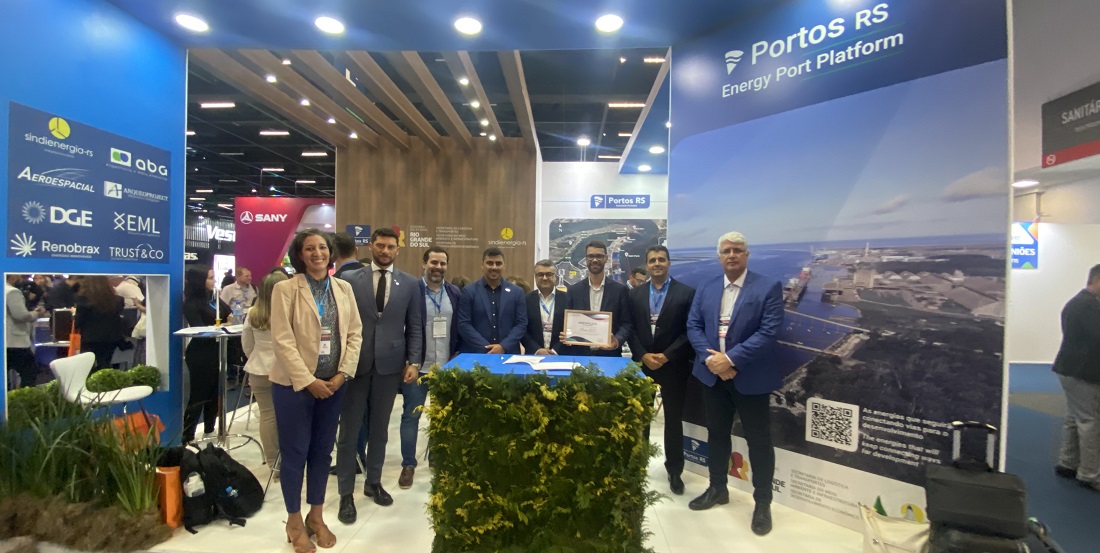
Portos RS and DockTech sign an unprecedented use-of-technology agreement, using Wilson Sons’ tugboats as data collectors
Sep, 14, 2023 Posted by Sylvia SchandertWeek 202338
The Israeli startup DockTech celebrated with Portos RS a new milestone in Brazil. On September 13th, for the first time, an agreement was signed by a port authority, Portos RS, which manages the public ports of Rio Grande, Pelotas and Porto Alegre, with a startup, which develops innovative technologies for real-time seabed monitoring to increase the efficiency and safety of port and shipping operations.
Founded by entrepreneur and former Israeli Navy officer Uri Yoselevich, the startup DockTech, through digital twin technology and massive data analysis, devised a solution that uses depth measurement data collected by tugs and other harbour vessels to create a virtual representation of the seabed of ports and waterways. The solution consists of real-time tracking of waterway depth and understanding how the silting pattern of ports can affect shipping and cargo transport safety.
After two years of collaboration, testing and data collection, the system monitors the seabed of waterways around the port facilities managed by Portos RS, using Wilson Sons’ tugboats and other harbour vessels. The vessels were equipped with devices that integrate the technological solution with tide sensors and AIS (Automatic Identification System) data, in addition to tidal, zoning and threshold settings.
The DockTech system commissioned by Portos RS uses vessel-mounted devices to obtain waterway depth information. Portos RS informs that controlling and monitoring waterway silting will enable the teams to obtain information more quickly and accurately. According to Portos RS, the tool will help to make specific, less costly interventions in critically silted areas.
DockTech operates in nine countries, with over 122 vessels which monitor 35 port facilities. In addition to monitoring the ports of Brazil using Wilson Sons’ 80 tugs, the startup operates in the United States (Tampa Bay and Mississippi River), Colombia (Barranquilla), Ecuador (Guayaquil), Australia (Geraldton), Germany (Hamburg), Romania (Danube), Spain (Valencia) and Israel (Ashdod).
“The agreement with Portos RS is a milestone in our activities in the country. DockTech’s technology applied in Brazil and in other countries shows that our solution supports the daily management of port operations. By capitalising on technology, our purpose is to avoid unnecessary costs through more assertive planning of dredging operations and seabed behaviour, also allowing more cargo to be loaded onto ships with even greater safety”, stated DockTech CEO and founder Uri Yoselevich.
Wilson Sons has been collaborating with DockTech for over three years, by making its vessels available to collect depth data in all ports it operates along the Brazilian coast.
“The technology developed by DockTech can collect data in real time, 24×7, by mapping out seabed variations. With this system, Portos RS will be able to see the depth conditions of the waterways under its jurisdiction, anticipating potential silting and vessel draft restrictions. The technology will deliver safer and more efficient port operations”, says Wilson Sons digital transformation director Eduardo Valença.
Portos RS currently manages more than 754 kilometres of waterways in the public ports of Rio Grande, Pelotas and Porto Alegre. In 2022, close to 40 million tons of cargo was handled at these ports.
“DockTech’s solution will provide greater visibility into the seabed conditions of the region’s waterways. It will help our dredging teams to make data-driven decisions to improve safety, sustainability and efficiency. This is an important step taken by Portos RS on the path towards innovation and digitalization”, said Portos RS president Cristiano Klinger.
In December 2021, Wilson Sons and DockTech signed an important agreement for the development of this technology. It is the technical cooperation agreement signed with the Santos Port Authority (APS), a relevant milestone in the improvement and use of the technology in the Port of Santos, Latin America’s largest port facility. Since then, in addition to Portos RS and APS, the startup has been confirming the value of its solution, with letters of intent signed for applications in many other Brazilian ports, such as SCPar — Porto de Imbituba, SCpar — São Francisco do Sul, and APPA — Port of Paranaguá.
-
DW 2020 EN
Feb, 22, 2021
0
DatamarWeek 23 february 2020
-
Sep, 20, 2022
0
Brazil receives 1st ever cargo of Egyptian grapes
-
Other Logistics
Jul, 08, 2022
0
Wilson Sons Logistics Center grows busier as automotive industry picks up in Brazil
-
Trade Regulations
Oct, 11, 2021
0
Brazil and Colombia discuss increasing bilateral trade


